|
H.R. 1884 – the Save Oak Flat Act introduced by Rep. Raúl Grijalva of Arizona – now has 100 co-sponsors with Thursday’s addition of Rep. David Price (D-NC).
This bill repeals the authority of the federal government to swap almost 2,500 acres in Arizona’s Tonto National Forest and give it to a foreign mining company. The swap, if allowed to go forward, includes the Oak Flat area that has been used as sacred ceremonial grounds by the Apache for centuries. If that happens, this centerpiece of the Apache religion would be transformed into a copper mine that would leave a hole as long as the Washington Mall and two Washington Monuments deep. Rep. Grijalva’s bill, which would stop the land swap and the mine, continues to gain support, including the backing of Rep. Tom Cole (R-OK). On the judicial side, there is also new reason for hope. As the U.S. Court of Appeals for the Ninth Circuit weighs its decision on the fate of these lands, that court must now consider a binding precedent that is only days old. In Ramirez v. Collier, the Supreme Court in an 8-1 opinion protected religious expression from a burden in a context that is far narrower than the one in the Oak Flat case. Support for the Apache is building because recognition is growing that at Oak Flat the religious rights of all Americans are at stake. Americans of all races and backgrounds are showing a dramatic shift in their support for school choice. It appears a large majority of Americans have reached a consensus in favor of school choice and policies that favor parental rights. This is a result from a new poll from the American Federation for Children and Invest in Education.
Tommy Schultz, CEO of the American Federation for Children, said “these poll numbers are stunning … a staggering majority.” “The past two years have exposed to the world what many in the parental choice movement have known for decades,” Schultz said. “No single educational environment is right for every child.” The survey was conducted by OnMessage, Inc., in telephone interviews between February 14 and February 17, surveying 1,000 voters likely to vote in the upcoming general election. This poll revealed deeper currents in the school choice debate. Three-quarters of respondents agreed that “parents should be in charge of decisions regarding their child’s education” and that “it is not fair that only wealthy parents truly get to decide where their child goes to school.” Majorities of Republicans (86 percent), Democrats (65 percent), and independents (74 percent) agreed with these characterizations. Among demographic groups, support for school choice includes 83 percent of Blacks and 77 percent of Hispanics. The survey asked voters whether they believe that “parents should have the right to remove their children from a failing public school and enroll them in a school that is succeeding academically.” Eighty-three percent agreed, including three-quarters of Democrats. Nearly 90 percent of Black voters agreed, as did 85 percent of Hispanics. The results of this survey match a poll by RealClear Opinion Research, which found that almost three-quarters of Americans say they support school choice. No doubt, these results are partly due to some school districts stubbornly clinging to school closures long after it was medically necessary. But such a wide national shift must reflect something broader and deeper: The pandemic and online learning has given parents a good look into not only how children are being taught, but also into what they are being taught – and not taught at all. (Hat tip to Alexandra DeSanctis) The Becket Fund just filed a letter in the U.S. Court of Appeals for the Ninth Circuit explaining to its judges how a Supreme Court opinion last week should shape a pending case. Short, terse, straight to the point and with ironclad logic, Becket’s letter gives reason to hope the Ninth Circuit will rule in favor of religious liberty and the Apache people.
The government had argued before the Ninth Circuit that a congressional deal to swap land held as sacred to the Apache religion would somehow not constitute a “substantial burden” on the free exercise of their religion. This claim was maintained despite the deal turning the land over to foreign mining company, which plans to dig for copper and leave a hole as long as the Washington Mall and as deep as two Washington Monuments. Becket’s letter told the Ninth Circuit that on Thursday, the Supreme Court ruled 8-1 in a case in which condemned prisoner John Henry Ramirez asked that his pastor be able to recite a prayer and touch him when he is to be put to death. What does this have to do with sacred land in Arizona? The Ramirez case upholds religious liberty by recognizing in a framework as narrow as an execution chamber that religion is substantially burdened when government actions make following one’s religious beliefs impossible. Before, a district court had rejected Ramirez’s Religious Land Use and Institutionalized Persons Act (RLIUPA) claim because, it reasoned, Texas’s refusal to grant his request did not substantially burden his religious exercise. “But the Supreme Court reversed and ruled for the prisoner,” Becket wrote, “noting the substantial burden was so obvious that Texas had failed to even ‘dispute’ it before the Court.” The government argued in the Apache case that no substantial burden exists if the government is “merely conducting its own affairs.” Yet the Supreme Court found a substantial burden on Ramirez’s free exercise of religion even within the strict execution protocol of the State of Texas, surely a good example of a state conducting its own affairs. Becket writes that “the government hasn’t just made plaintiffs’ religious exercise more costly via penalties or denial of benefits. Rather, it has taken action that will preclude the exercise altogether – handing Oak Flat over to be physically destroyed, thus rendering the plaintiffs’ continued religious exercise there physically and objectively impossible.” “That is a substantial burden.” It is also a binding precedent that should spell good news for the Apache. SCOTUS: Being Criticized by Censure Does Not Violate First Amendment Rights of Elected Official3/25/2022
Houston Community College System v. WilsoNThe U.S. Supreme Court today unanimously held that an elected body censuring one of its members is not a violation of the First Amendment. In so doing, the Court correctly protected speech and political expression from heavy-handed judicial regulation.
The Court took up this case because a split panel of the U.S. Court of Appeals for the Fifth Circuit oddly concluded that a member of an elected board censured by his colleagues has a viable First Amendment claim. David Wilson, one of nine trustees of the board of the Houston Community College (HCC) System, was publicly censured after what the Court described as years of escalating hostility that included lawsuits, a private investigator, robocalls and accusations by Wilson of ethical violations. The HCC had enough and censured Wilson via a resolution calling his conduct “not only inappropriate, but reprehensible,” and imposed penalties rendering him ineligible for officer positions on the board and pulling his expense account. While the Fifth Circuit ultimately concluded that the penalties were not a problem, it was the criticism it bizarrely thought went too far and encroached upon Wilson’s First Amendment rights. Wilson had tried to make a distinction between a mere reprimand, which does not impair speech, with a disciplinary censure, which he claimed did materially impair his freedom of speech. Justice Neil Gorsuch, writing for a unanimous opinion, found this was a distinction the justices “find hard to see.” Justice Gorsuch noted that since colonial times, assemblies and elected bodies have been free to censure their members. In 1833, Justice Joseph Story observed that even the “humblest assembly” in the United States enjoyed the power to prescribe rules for its own proceedings. Justice Gorsuch wrote: “Elected representatives are expected to shoulder a degree of criticism about their public service from their constituents and their peers – and to continue exercising their free speech rights when the criticism comes.” In other words, elected officials can’t claim to be free-speech snowflakes who can dish it out but not take it. As Justice Gorsuch aptly pointed out, the act of censuring David Wilson was, itself, speech. Justice Gorsuch noted that this is a narrow ruling, leaving room for First Amendment considerations in other contexts. “When the government interacts with private individuals as sovereign, employer, educator, or licensor, its threat of censure could raise First Amendment questions. But those questions are not this one.” Had the Court not corrected the Fifth Circuit, there would have been no end of litigation by aggrieved politicians. Judge Edith Jones, who dissented from the Fifth Circuit’s decision, had warned that the panel’s ruling “threatens to destabilize legislative debate, and invites federal courts to adjudicate ‘free speech’ claims for which there are no manageable legal standards.” Now, as before, the best remedy to speech one finds objectionable is more speech, which no doubt David Wilson will provide and, in all likelihood, receive more of in return as well. The New York Times ran an even-handed editorial denouncing threats to free speech from progressive cancel culture and conservative attempts to legislate speech in the classroom. For a surprising number of commentators, one of America’s largest newspapers taking a moderate stance in favor of free speech was a red flag. Critics from both the left and right denounced the Gray Lady for “both-sidesism,” highlighting the very social fissures the editorial describes.
Most notable are the results of recent poll commissioned by The Times Opinion and Siena College. It found:
The Times article is long, detailed, and worth reading. It is balanced and incisive, though with many debatable points. Overall, it does a good job of summing up that this crisis is largely the result of America’s culture and ideological wars, not the kind of government censorship one finds in Putin’s Russia. The Times observes that “the old lesson of ‘think before you speak’ has given way to the new lesson of ‘speak at your peril.’” We are reminded that the letter of the First Amendment, which forbids official censorship, necessarily relies on a widespread spirit of tolerance. And free speech is further encouraged when we have curiosity about issues in which “the other side” might actually know something we don’t. Proving Oscar Wilde’s dictum that irony is wasted on the stupid, more than 100 Yale Law students shouted, cursed, physically threatened, clapped and pounded on walls to silence a panel on civil liberties and free speech.
The March 10 event was a panel hosted by the Yale Federalist Society to bring together Monica Miller of the progressive American Humanist Association and Kristen Waggoner of the Alliance Defending Freedom (ADF). This progressive atheist and conservative Christian were at Yale to discuss Uzuegbunam v. Preczewski, a case in which the U.S. Supreme Court upheld 8-1 the ability of a Christian student to vindicate in federal court his right to proselytize on campus, even if he sought only nominal damages. Had the Yale students listened, they would have heard Miller saying that without the Uzuegbunam ruling, her organization would not be able to protect the speech rights of LGBT students. Such distinctions were lost in the violent din. One protestor told a member of the Federalist Society that she would “literally fight you, bitch.” Student members of the Federalist Society were jostled as they attempted to leave the room. They were rescued by police. It is past time for universities to do more than send an administrator in to such events to futilely plead for free speech. Any person who engaged in such behavior while at work would be fired. Any lawyer who brought these tactics to a court room would be escorted by the bailiff to jail. Given that Yale Law produces presidents, senators, justices, and judges, it is important to all Americans that it educate our future leaders to not threaten speakers. An expulsion or two would probably work wonders. DR. A, ET AL, V. KATHY HOCHUL, GOVERNOR OF NEW YORKProtect the First Foundation today asked the Supreme Court to hear the case of healthcare workers in New York State who were fired because of a religious objection to the coronavirus vaccine.
Background: Some practicing healthcare workers object to receiving COVID-19 vaccines because of the use of fetal cells in the vaccines’ development process (though no such cells appear in the mRNA vaccines). Most states accommodate this small minority of Americans who have such religious objections to receiving the coronavirus vaccine. New York State, however, is taking a different approach. When it issued a mandate for all healthcare workers to be vaccinated, the state broadened exemptions for those with medical concerns. But the state denied any accommodation for those with religious objections to the vaccine. It fired healthcare workers with such objections and cut them off from access to unemployment benefits. The Case and the Brief New York argues that the medical exemption is “not comparable” to the religious exemption because it “advances rather than undermines” the state’s interest in “protect[ing] healthcare workers themselves.” The Second Circuit, in upholding New York’s refusal to allow a religious exemption, held that the medical exemption did not trigger strict scrutiny because vaccinating “a healthcare employee who is known or expected to be injured by the vaccine would harm her health and make it less likely she could work.” The Protect the First Foundation countered: “But that reasoning overlooks the fact that terminating religious objectors also harms the state’s interest in preventing staffing shortages and keeping healthcare workers on the front lines. More fundamentally, it ignores that the medical exemption undermines the government’s core asserted interest in ‘prevent[ing] the spread of COVID-19 in healthcare facilities among staff, patients, and residents.’” The brief noted that as far back as Church of the Lukumi Babalu Aye, Inc. v. City of Hialeah in 1993, the Supreme Court recognized that laws discriminate against religious practice when they “fail to prohibit nonreligious conduct that endangers [the government asserted] interests in a similar or greater degree” to religious conduct. The core issue in this case traces its root to a 1990 Supreme Court decision in Employment Division v. Smith. Under that decision, and later cases, laws that incidentally burden religion are not subject to strict scrutiny—the standard under which laws burdening other constitutional rights are reviewed—if they are neutral and generally applicable. The Supreme Court has made clear that laws are not generally applicable when they forbid religious conduct while allowing secular conduct that undermines the government’s interests in a similar way. Protect the First Foundation observed: “As the Second Circuit recognized, allowing unvaccinated workers invoking the medical exemption to remain on the front lines presents ‘comparable risks of both contracting and spreading COVID-19,’ regardless of ‘the reason that the employee is unvaccinated’ … What’s more, firing healthcare workers with religious objections undercuts the state’s asserted interest in preventing staffing shortages.” Protect The 1st will report on further developments if the Supreme Court adopts this case. Wyoming Bill to Outlaw Gender Studies Is the Wrong Approach to Upgrading College Curricula3/17/2022
Many conservatives and moderates alike are critical of the direction academia has taken in recent years.
At Skidmore College, one can take “The Sociology of Miley Cyrus: Race, Class, Gender, and the Media.” At Oberlin, one can study “How to Win a Beauty Pageant,” (not actually a how-to, but an “analysis of the interplay of race, gender, class, sexuality and nation”). And at Occidental College, one can take a course that delves into "phallogocentrism." While studies of the U.S. Constitution and what used to be called “civics” languish, universities and colleges are elevating courses once considered fringe electives and bringing closer to the center of their liberal arts programs. Many observers take a skeptical view of such gender studies courses that analyze society through “gender hierarchies” and gender inequalities in ways that seem increasingly rigid, ideological, and abstruse. Whatever one’s view of these courses and the philosophies they represent, however, Protect The 1st recommends that politicians resist the impulse to restrict academic freedom at public institutions with broad-brush directives. The Wyoming state Senate helped crystalize this question by recently passing a bill that stipulates: “As a condition of these appropriations, the University of Wyoming shall not expend any general funds, federal funds or other funds under its control for any gender studies courses, academic programs, co-curricular programs or extracurricular programs.” Wyoming senators are trying to perform the delicate task of challenging academia’s prevailing culture with a sledgehammer where a scalpel is required. Such a heavy-handed approach is sure to backfire, spurring a rebellion by professors angered by an encroachment on their freedom to teach. State legislatures and the taxpayers they represent certainly have a right to influence the content of state-supported teaching. But when the directives veer into viewpoint discrimination and First Amendment rights, the result will only be fruitless litigation. This point is clear in the Wyoming bill’s restrictions on student organizations, which run afoul of Rosenberger v. Rector and Visitors of the University of Virginia. In that opinion, the Supreme Court held that it is unconstitutional to deny funding to Christian student organizations on the basis of viewpoint. The Wyoming law is sure to be slapped down under Rosenberger because it effectively bans support for student organizations and speakers with particular viewpoints on gender-related issues. State legislators have every right to air this debate. Universities and colleges should not be immune to questioning. Ultimately, however, there is only one effective route forward for better curricula – long, arduous, criticism, debate, and reform within the academy. In 1990, in a case called Employment Division v. Smith, the Supreme Court famously held that the government can substantially burden religious beliefs and exercise as long as it does so in a way that is both neutral and generally applicable. In the intervening years, the lower courts have struggled to define what makes a law generally applicable. Is a law generally applicable, for example, if it allows some secular exemptions? What about an administrative rule that targets and forbids religious conduct, while permitting otherwise identical secular conduct? The Supreme Court has a chance to answer that latter question in a case now pending before it, Dr. A. v. Hochul.
The case originated in New York. The state issued a mandate for all healthcare workers to be vaccinated against Covid-19. It provided exemptions to healthcare workers who sought medical accommodations, but denied all requests for religious accommodations. After firing healthcare workers with religious objections to the vaccine, it cut them off from any access to unemployment benefits. Remarkably, the Second Circuit Court of Appeals held that the vaccine mandate was generally applicable despite the fact that it allows for medical exemptions. How could this be? It isn’t like the risk of transmission is any lower for those who are unvaccinated for medical reasons than it is for those who are unvaccinated for religious reasons. And both groups seek the same accommodation—the ability to keep their jobs despite their vaccination status. To us, it seems clear that the Second Circuit got things wrong. A law that applies differently to religious objectors than it does to medical objectors is, by definition, not generally applicable. And as Justice Kavanaugh explained just last year, a law fails Smith’s requirement of general applicability if a “single secular analog is not regulated.” A majority of the Justices in Tandon v. Newsom, a case heard on the Court’s expedited emergency docket, made things just as clear: heightened judicial scrutiny dooms a law if “any comparable secular activity” is treated “more favorably than religious exercise.” Because the Second Circuit allowed the New York mandate to treat going to work unvaccinated for medical purposes differently than going to work unvaccinated for religious reasons, the Second Circuit departed from Tandon’s clear guidance. Protect The 1st urges the Supreme Court to take up this case to clear up that misapplication of the law and to make Tandon’s rule clear in a case in the normal course, with full briefing and oral argument. The Court should take this opportunity to apply serious constitutional scrutiny to New York’s selectively applicable vaccine mandate. Concordia University Wisconsin is a private, Lutheran university in scenic Mequon, Wisconsin, fast by the western shore of Lake Michigan. It serves about 4,000 undergraduate students with 78 majors and minors, as well as postgraduate students with programs that include pharmacology and nursing. Though a private, religious institution, CUW upholds academic freedom in its contracts with professors and in its faculty handbook.
But a funny thing happened on the way to the academic forum … Dr. Gregory P. Schultz, a full professor of philosophy, who has lectured at Oxford and Cambridge Universities, discovered the limited boundaries of CUW’s academic freedom when he dared to write and post a spirited and eloquent paper that critiqued “systemic Woke-ism” and “Woke Dysphoria” as an “educational heresy” that endangers CUW’s mission. He ridiculed Woke philosophy as illiterate and illiberal in its unwillingness to allow any questioning of its tenets. Dr. Schultz worried that fashionable beliefs were leading this religious school to “cultural abandonment of the gospels.” And he dared question the standards by which the university is conducting its search for a new president. We owe it to our friends at the Foundation for Individual Rights in Education (FIRE) for telling us what happened next. On Friday, Feb. 18 Schultz received an email from the university’s president requesting that he attend a meeting that afternoon to discuss the article. Schultz responded that he had missed the email because he was teaching classes and visiting students during his posted office hours. He was on his way to teach his third class of the day and offered to meet the next Monday. “Request denied,” wrote the president. “I will see you at 4 p.m., Greg.” Schultz did not see the response because he was teaching. That same day Schultz was suspended pending an investigation into multiple allegations of misconduct stemming from the article, including “conduct unbecoming a Christian.” CUW relieved Schultz as a teacher, from visiting the campus, and prohibited him from any contact with students or his faculty colleagues. In one request worthy of the Inquisition, the president demanded that Dr. Schultz “recant” his article or face the modern form of burning at the stake — termination. As FIRE noted: “Suspension is a punishment, and not a light one, entitling Schultz to due process before it is imposed. Schultz is unable to teach his classes or even communicate with his students and other faculty members. Each day of his suspension that goes by is a further disruption to Schultz’s career as an educator and to his relationships with his students and colleagues.” CUW’s own policies require that a faculty member accused of misconduct receive proper notice of the charges, a chance to respond, the formation of a review committee and a formal hearing. Fortunately, the legal eagles at FIRE are on the case working for the restoration of Gregory Schultz’s speech rights. Make no mistake, Dr. Schultz’s paper was a tart polemic, sure to insult those in favor of imposing a progressive agenda at CUW. But his invective remained high-toned and erudite. He did not engage in ad hominems or puerile name calling. Protect The 1st would only add the following thought experiment: Imagine if a professor at CUW had written a similarly sharp invective, but this time condemning CUW for being a citadel of racism and gender discrimination. Does anyone think that such a polemic would cause administrators to immolate a career? But if that did happen, rest assured, First Amendment advocates from FIRE to PT1st would come to that professor’s defense. This month, the Supreme Court will meet to consider whether to hear two cases asking whether a state can constitutionally require its attorneys to join and fund a state bar association.
The cases, McDonald v. Firth and Schell v. Darby, are the latest in a long line of cases where the lower courts have felt compelled by Supreme Court precedent to ignore the First Amendment harms flowing from compelled speech and association. We hope that the Court will decide to hear one or both of those cases. Both present the Supreme Court with the opportunity to ensure that attorneys are not put to the coercive choice of, as the Court said in the recent case Janus v. AFSCME, “betraying their convictions” and earning a living. There are many activities that give rise to this coercive choice. Among them, mandatory state bars advance controversial political and ideological positions by filing briefs, by lobbying, or even by taking official positions on behalf of their members. In the middle of a recent ballot initiative to change the way that Utah chooses judges, for example, the mandatory Utah State Bar issued a statement opposing such changes, emphasizing that the Bar “fully supports Utah’s current merit system as the best way to select a competent, independent judiciary.” In a different—but related—context, the State Bar of Michigan in 2013 actively campaigned for “all payments for communications referring to judicial candidates” to be “reportable to the Secretary of State.” It should come as no surprise that members of those bars, like members of every group, differ on the proper resolution of those issues. McDonald and Schell thus ask, at bottom, two questions. The first is whether attorneys give up—as a precondition to getting a law license—their right to fund only that legislation or those messages with which they agree. The answer to that question should be no. But the second question is equally important and should similarly be answered no. It asks whether—regardless of the funding question—attorneys can be forced to associate with groups with which they don’t want to associate, whether because of that group’s public positions or for, frankly, any other reason. We’ll continue monitoring these cases and hope that the Supreme Court agrees to review them and, ultimately, protect the First Amendment rights of attorneys. In the meantime, for a broader picture of ways that mandatory bars act in ways that harm their members, you can read our brief in the McDonald case here. The Supreme Court heard oral argument last week in Egbert v. Boule asking whether people whose First Amendment rights have been violated by federal agents can seek monetary damages to remedy the violation even if Congress has never allowed such a case by statute.
Earlier this year, Protect the 1st filed a brief explaining why, in those circumstances, there should be some remedy available. Unfortunately, at oral argument, multiple Justices seemed skeptical about finding such an implied cause of action. Justice Kagan explained that implied causes of action have been “basically a remedy for Fourth Amendment violations.” Justice Barrett expressed her belief that finding a First Amendment cause of action would be “difficult.” Justice Thomas asked why the Court should find any new cause of action given how the Court has “universally declined” to do so in “recent history.” Justice Gorsuch followed the same line of reasoning. Justice Alito has never been a friend of causes of action untethered from a statute. Based on how oral argument went, we would guess that the Court will hold that there is no implied First Amendment cause of action. The more interesting question is this: If Judge Ketanji Brown Jackson—President Biden’s choice to replace Justice Stephen Breyer—had already been confirmed, how would she vote? Judge Jackson gave an answer to that question nearly ten years ago when she decided Patterson v. United States. That case began after Anthony Patterson was “arrested for using profanity in a public park.” Judge Jackson explained that “where … there is an allegation of retaliatory arrest in the absence of probable cause, the plaintiff has a viable First Amendment claim.” Jackson concluded “that Patterson's First Amendment . . . claim — which alleges that Patterson was arrested without probable cause and ‘solely on account of the content of his speech’ is actionable.” In other words, Jackson answered yes on a question the Supreme Court now seems poised to answer no. Jackson’s Patterson opinion is just one reason why we are optimistic about Jackson’s historic nomination. The opinion shows that Jackson is willing to protect constitutional rights regardless of whether Congress has given its imprimatur. While it is unfortunate that the current court seems unwilling to follow that path, Jackson’s voice on the court may well be what is needed to convince justices to expand the concept of implied causes of action in First Amendment claims in the future. We expect that Jackson will be swiftly confirmed and, if the Court gets things wrong when it decides the Egbert case, we hope that a Justice Jackson will be successful at convincing her new colleagues that her Patterson decision was rightly decided. On Tuesday, a rowdy crowd inflicted a 45-minute heckler’s veto on constitutional scholar Ilya Shapiro for a poorly worded tweet.
Attempting to speak at a Federalist Society event at the UC Hastings College of the Law in San Francisco, Shapiro was confronted with the sharpest arguments these law students and protestors could muster: “You’re a bald coward!” “Freedom of speech, baby.” “Remove him off the [effing] campus!” And those were the eloquent ones. In the past, heckled-cancelled speakers often surveyed the room and retreated. There was often an air of apology in their retreats, as if they agreed they should be cancelled. Shapiro defiantly remained standing at the podium for the duration of what would have been his talk. To its credit, Hasting’s dean of academics tried to quell the crowd by telling them a law professor was going to confront Shapiro with questions about his tweet. But that would be dialogue, which would lack the self-righteous satisfaction of vitriolic and unrelenting denunciation. One wonders what the dean would do if students behaved this way in class? Give them all A’s? Actually let the teachers teach? There is a sense that the wheel is turning and that campus speakers are not going to meekly accept such bullying and abuse. Let us hope that Georgetown University finds its courage and retains Shapiro as head of its Constitution Center. After all, what could be a more teachable moment about the U.S. Constitution and the First Amendment? Protect The First Foundation filed an amicus brief today in the case of the “praying coach” now before the U.S. Supreme Court.
This case involves the suspension of football coach Joseph Kennedy by Washington State’s Bremerton School District for saying thirty-second prayers on the football field after games. Coach Kennedy initially prayed alone but allowed team members who asked to join him to do so. The PT1st brief informs the Court that Coach Kennedy, in addition to being protected “twice over” by the First Amendment, is also protected by Article VI’s No Religious Test Clause. The brief explains that the rights of the coach were violated by a lower court that held that his prayers amounted to government speech – an assertion that served to “misattribute and cheapen his speech.” PT1st corrects this view, noting that it is “factually wrong – and contrary to common sense – to attribute a public employee’s personal expression of individual faith to the government, even if that expression occurred on the job.”
The brief’s main contribution is that it shows the Justices that if personal expressions of religious faith are government speech when uttered by public employees, governments may be able to impose a “back-end” religious test that tells people of faith that they are not welcome in public employment. That, PT1st explained, is a “particularly harmful” message that, “[i]f left standing, … will … limit public employment to members of favored religions that demand no visible, public displays of faith, while denying employment to those whose exercise of religion needs to be overt and visible to others.” PT1st explained that this would be a classic religious test: Just like the government cannot tell a would-be employee that she must forsake her beliefs as a condition of entering public employment, it cannot impose a requirement that she abandon religiously required expression as a continuing condition of employment after hiring her. “For all these reasons, we are optimistic the Court will rule in favor of free speech and freedom of religious expression,” said Gene Schaerr, Protect The 1st general counsel. “At one time or another, a majority of the sitting Justices have expressed sympathy for protecting religious speech, and I hope that they do so again here.” [1] Emphasis added. |
Archives
June 2024
Categories
All
|
ABOUT |
ISSUES |
TAKE ACTION |



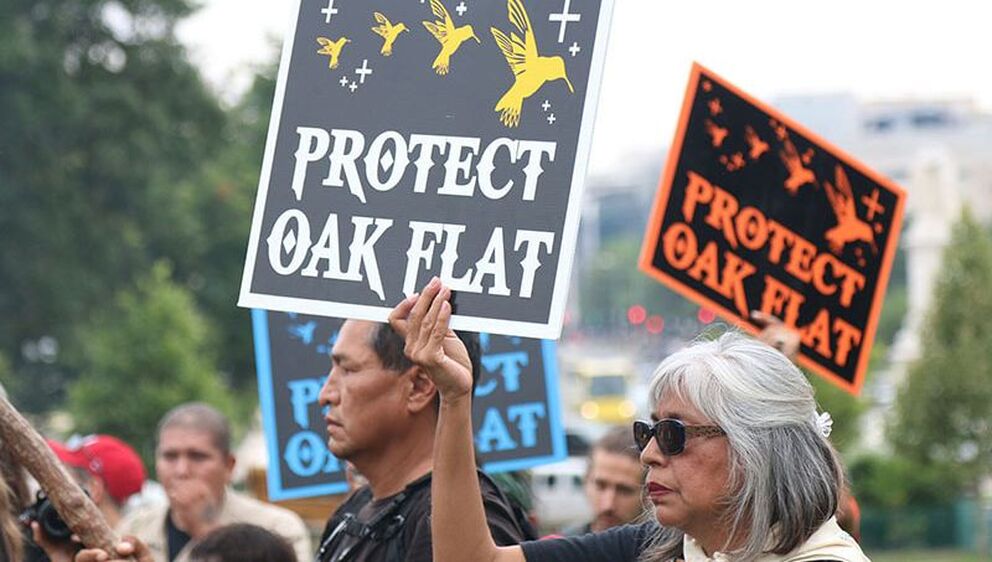
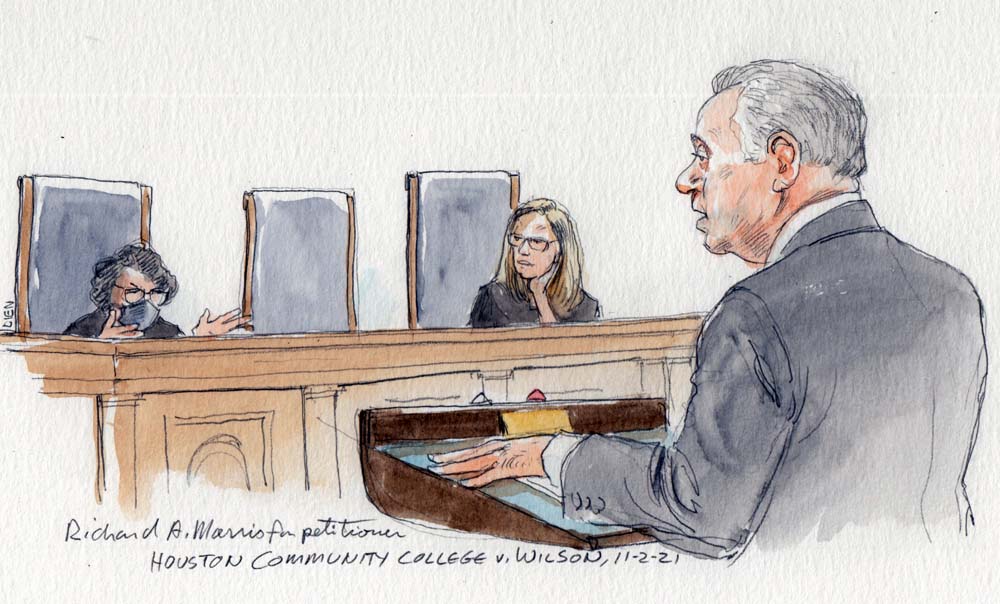



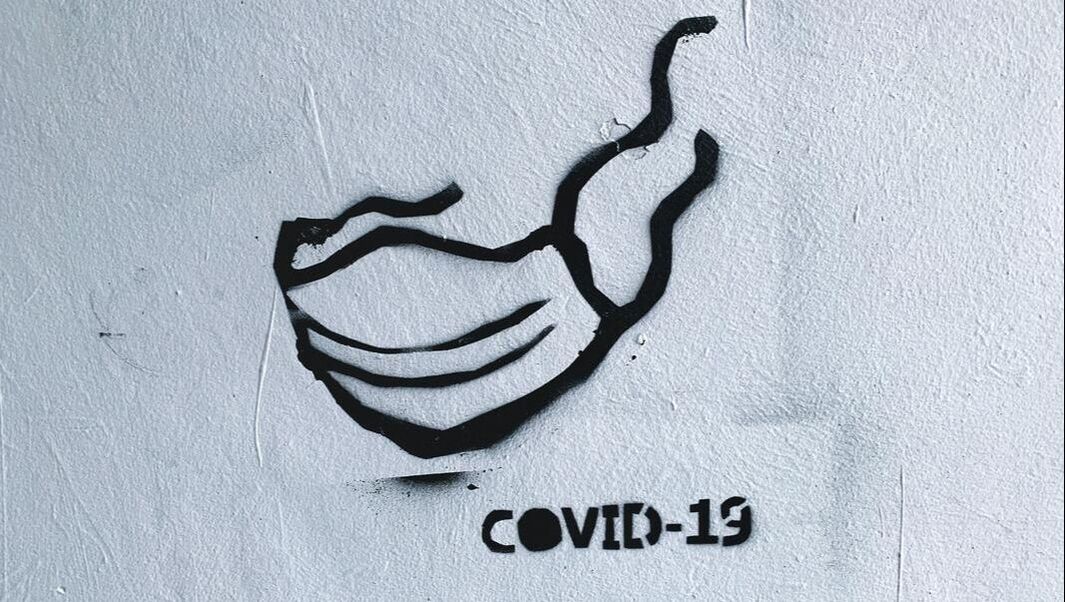
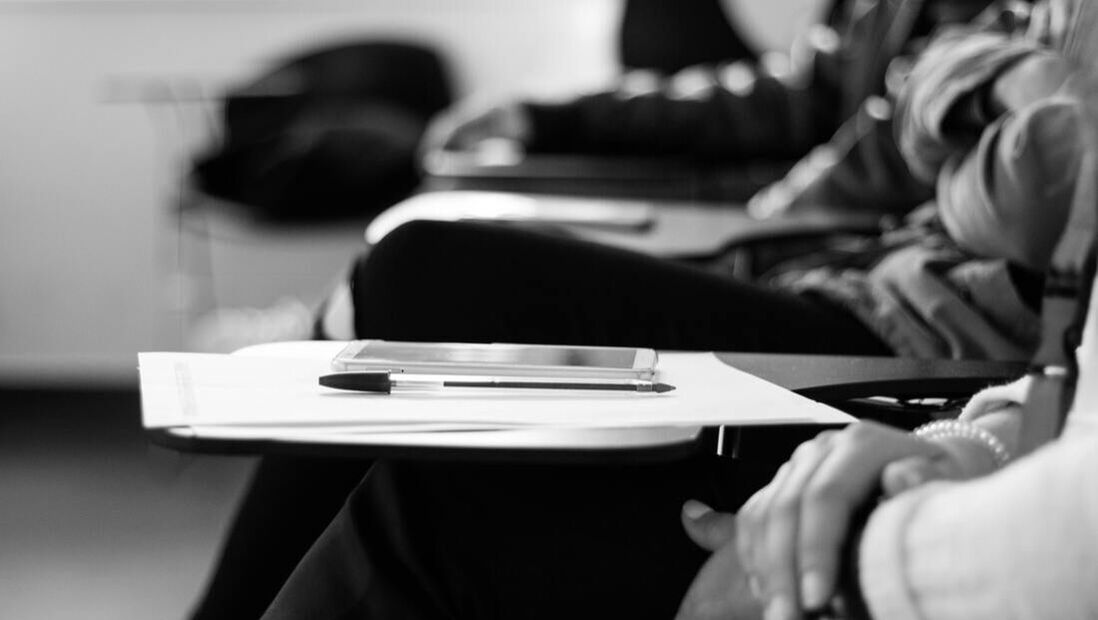
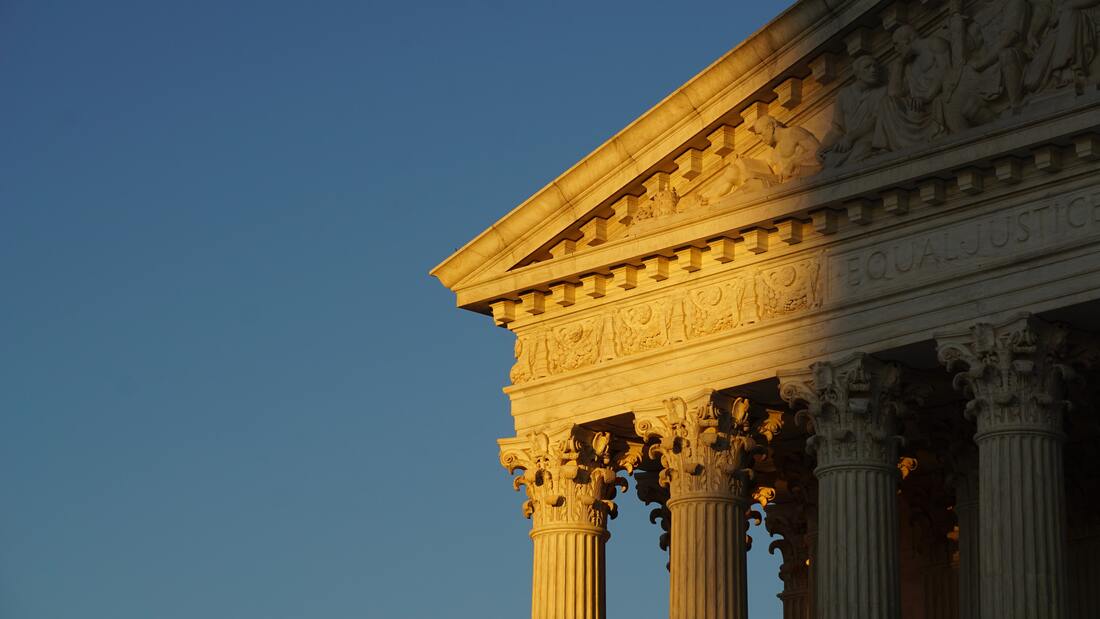
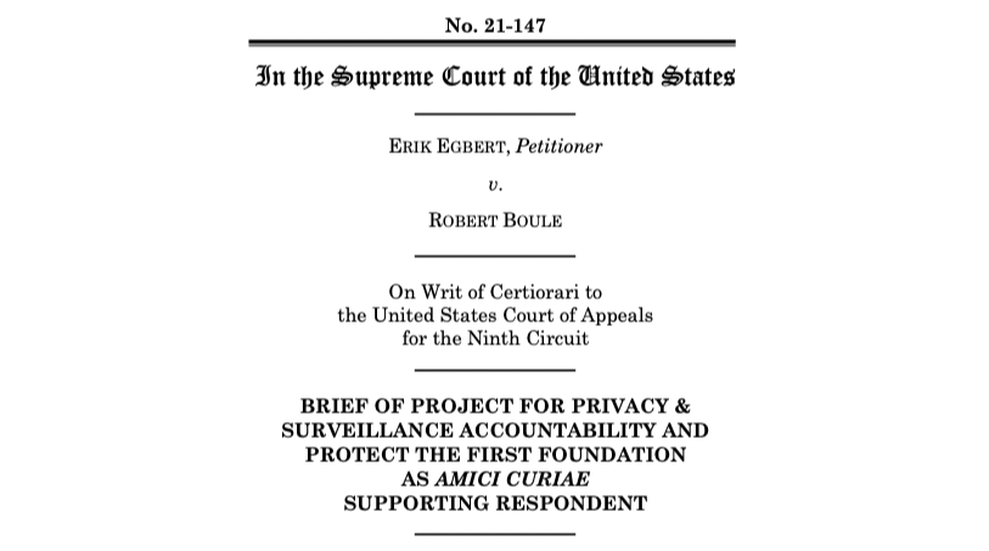
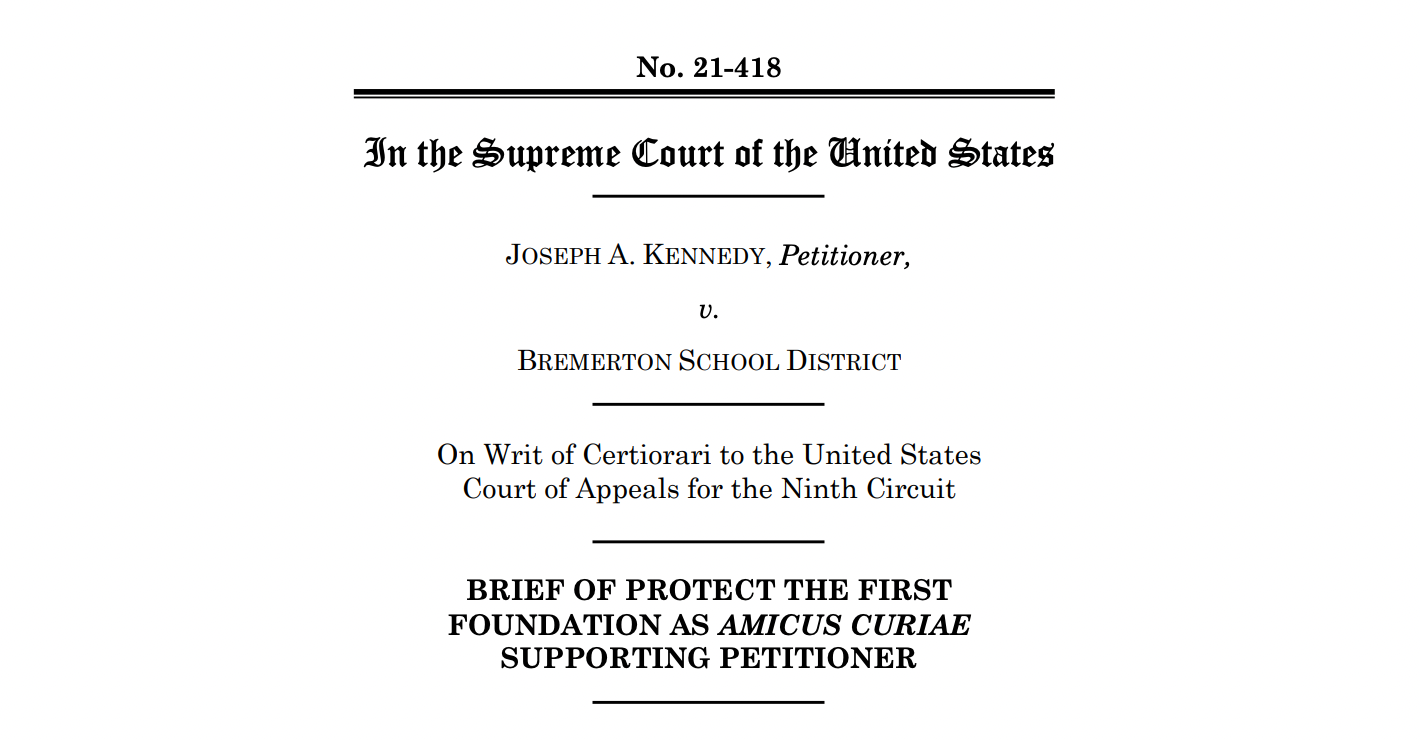
 RSS Feed
RSS Feed